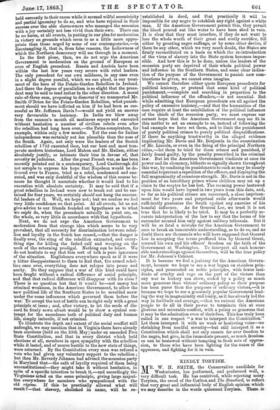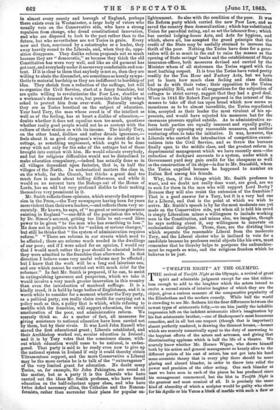KINDLY TORYISM.
ltf R. W. H. SMITH, the Conservative candidate for 1_V_L Westminster, has performed, and performed well, a very difficult task. He has contrived, while rejecting noisy.. Toryism, the creed of the Carlton and The Standard, to reflect , that very great and influential body of English opinion which we may describe in the words quiescent Toryism.. Therein;
in almost every county and borough of England, perhaps there exists even in Westminster, a large body of voters who usually vote on the Conservative side, who have a strong repulsion from change, who dread constitutional innovation, and who are disposed to look to the past rather than to the future, but who nevertheless are not Tories in grain. Every now and then, convinced by a catastrophe or a leader, they sway heavily round to the Liberals, and, when they do, oppo- sition disappears. They dislike reform proposals not so much because they are " democratic," as because they think the old Constitution has worn very well, and like an old garment has got easy, and everybody under it seems very comfortable and con- tent. If it is clear to them that anybody is not so, then they are willing to abate the discomfort, are sometimes as keenly sympa- thetic to material hardship as they are indifferent to hardship of idea. They shrink from a reduction of the suffrage, but will re-organize the Civil Service, start at a fancy franchise, but are quite willing to revolutionize the Poor Law, shudder at a workman's demand for a vote, but press into the lobby when asked to protect him from over-work. Naturally enough they are as Tories heretical on the subject of education. Your hard Tory, the man whose creed is of the intellect as well as of the feeling, has at heart a dislike of education,— doubts whether it does not equalize men too much, questions whether really good people would not be as content with the culture of their station as with its income. The kindly Tory, on the other hand, dislikes and rather dreads ignorance,— feels about it as good clergymen's wives do about dirt in a cottage, as something unpleasant, which ought to be done away with not only for the sake of the cottager but of those brought into contact with him. He would educate everybody, and but for religions difficulties would not be disinclined to make education compulsory,—indeed has actually done so in all villages dependent upon factories, that is, in half the villages of the North. In ecclesiastical matters the class is, on the whole, for the Church, but thinks a great deal too much fuss is made about trifling differences, and while it would on no account turn the Bishops out of the House of Lords, has an odd but very profound dislike to their making themselves very prominent in it.
Mr. Smith reflects these opinions, which scarcely find expres- sion in the Press,—the Tory newspapers having been for years more violent than their own leaders,—and reflects them very ac- curately. He knows, he says, of " no great or serious grievance existing in England "—one-fifth of the population the while, by Dr. Simon's account, getting too little to eat—and likes power to be given " to the mall who has something to lose." He does not in politics wish for " sudden or serious changes," but still he thinks that " the system of administration requires reform." " There are reforms in our streets which need to be effected ; there are reforms much needed in the dwellings of our poor; and if I were asked for an opinion, I would say that I would much rather the poor should be educated before they were admitted to the franchise than afterwards. In that direction I believe some very useful reforms may be effected ; but I know that the work will be a long and laborious one, and one which cannot be carried out with much eclat for the reformer." In fact Mr. Smith is prepared, if he can, to assist in extinguishing ignorance and pauperism, which we take it would involve a very much greater innovation in this country than even the introduction of manhood suffrage. It is a kindly creed, it is held by large bodies of Englishmen, and it is worth while to consider for a moment whether the Tory party, as a political party, can really claim credit for carrying out a policy such as this, a policy that is which, while refusing to meddle with the franchise, will support education, the social amelioration of the poor, and administrative reform. We scarcely think so. As a matter of fact, all measures for giving assistance to national education have been carried not by them, but by their rivals. It was Lord John Russell who moved the first educational grant ; Liberals established, and their Archbishop worked out, secular education in Ireland; and it is by Tory votes that the conscience clause, with- out which education would cease to be national, is endan- gered. That party is said to be ready even now to give up the national system in Ireland if only it could thereby obtain Ultramontane support, and the more Conservative a Liberal may be the more certain he is to talk of the " extravagance" of the very limited grant for education. No doubt many Tories, as, for example, Sir John Pakington, are sound on the matter, but as a party it is the Liberals who have carried • out the ideas Mr. Smith professes, who have forced education on the half-reluctant upper class, and who have twice defied necessary allies, the Catholics and the Noncon- formists, rather than surrender their plans for popular ea-
lightenment. So also with the condition of the poor. It was the Reform party which carried the new Poor Law, and so saved the country from demoralization ; which has'substituted Union for parochial rating, and so set the labourer free; which has carried lodging-house Acts, and Acts for hygiene, and which, above all, has accepted the grand principle that the credit of the State may be usefully strained to increase the thrift of the poor. Nothing the Tories have done for a gene- ration will do so much in the end to raise the masses as the opening of State savings' banks and the establishment of State insurance-offices, both measures devised and carried by the Minister whom of all statesmen the Tories regard with the most loathing respect. It is true the Tories have voted pretty readily for the Ten Hour and Factory Acts, but we have yet to learn how much class feeling and class dislike had to do with their votes ; their opposition to the Union Chargeability Bill, and to all suggestions for the subjection of cottages to strict survey, suggest that they had a good deal. When in 1845 Sir Robert Peel proposed in the interest of the masses to take off that tax upon bread which now seems so monstrous as to be almost incredible, the Tories repudiated him, accepted as their leader the most virulent of his op- ponents, and would have rejected his measures but for the enormous pressure applied outside. As to administrative re- form both parties are equally innocent and equally guilty, neither really opposing any reasonable measures, and neither venturing often.to take the initiative. It was, however, the Liberals who carried the introduction of competitive exami- nations into the Civil Service, and so threw the bureaus finally open to the middle class, and the greatest reform in departmental management which we have recently seen—the reduction of dockyard accounts to a system, under which a Government yard may gain credit for the cheapness as well as the construction of its ships—is due to Mr. Stansfeld, whom the Tories expelled because ho happened to number an Italian Red among his friends.
Why, then, if the things which Mr. Smith professes to want, and we doubt not really does want, are good, are we to seek for them in the men who will support Lord Derby? Because they will also resist the extension of the franchise? That is a good answer for a Tory, but it is a very bad one for a Liberal, and that is the point at which we wish to arrive. Mr. Smith's speech is by far the most moderate one yet made on the Conservative side, yet when all is told his arced is simply Liberalism minus a willingness to include working men in the Constitution, and minus also, we imagine, though he says nothing about it, any willingness to innovate on ecclesiastical discipline. Those, then, are the dividing lines which separate the reasonable Liberal from the moderate Tory, and the Liberal elector who is inclined to vote for a candidate because he professes social objects like his own, must remember that he thereby helps to postpone the enfranchise- meat he regards as wise, and the religious freedom which he believes to be just.































 Previous page
Previous page